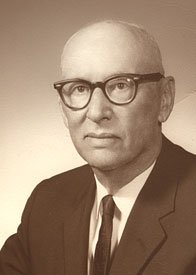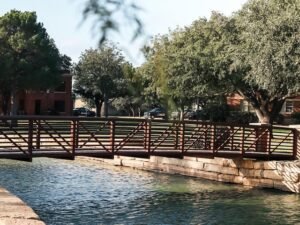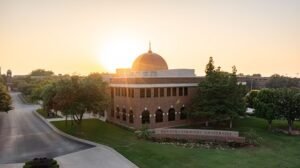Robert M. Wagstaff
Attorney/Legislator, BA 1913
 Robert Wagstaff, attorney, legislator, conservationist, rancher, and historian was an influential force in Abilene life for more than six decades, following a tradition of community service established by his father.
Robert Wagstaff, attorney, legislator, conservationist, rancher, and historian was an influential force in Abilene life for more than six decades, following a tradition of community service established by his father.
Robert McAlpine Wagstaff was born on September 2, 1892, in Abilene, Texas, to John Miles and Bessie (McAlpine) Wagstaff. His father, former president of Buffalo Gap Presbyterian College, started practicing law in Abilene in 1890, establishing the law firm that Robert would later lead.
Robert attended Abilene public schools and graduated from Simmons College Academy in 1913 with a bachelor of arts degree. While a student at Simmons in 1912, he became scoutmaster of the first organized Boy Scout troop in Abilene.
In 1913, Robert began law school at the University of Texas. While in Austin, he joined the Texas Brigade, and in 1916, a month before he was to graduate from law school, he was called to active duty on the border during the raids of Pancho Villa. He received his law degree in absentia and was admitted to the bar in 1916.
Wagstaff is credited with initially advancing and pushing the idea that Abilene seek a military base. As World War I neared, this idea grew into the establishment of Camp Barkeley. He later worked on the project that produced Dyess Air Force Base.
When World War I broke out, Wagstaff, then an Army captain, was sent home to Abilene to organize Company I, Seventh Texas Infantry, the forerunner of the local National Guard. Wagstaff commanded the unit during training and while overseas until he was transferred to other combat duty.
After service in Europe, Wagstaff retired as a major and returned to Abilene to join his father in law practice.
Wagstaff married Texas Orms on February 14, 1931, and the couple had two children, Marnie and John.
He served in the legislature for two consecutive terms from 1931 to 1935. During the East Texas oil boom he helped write conservation statutes that brought stability to the oil and gas industry. He wrote and sponsored, along with Senator Walter Woodward of Coleman, the Wagstaff-Woodward water priority act, which is still in effect.
Wagstaff also authored the legislation that set up the state assumption of local road bonds, laying a foundation for the modern highway system.
He also sponsored a bill setting aside land in Big Bend for a state park, an action that made possible the present Big Bend National Park. He was a leader in water development projects, and was an ardent booster of the proposal to import water from the Mississippi for dry West Texas. He was honored for his pioneering efforts to reclaim sandy “shinnery” wasteland by replacing the natural shin oak with grasses sown from airplanes.
A lay historian, he wrote articles on West Texas history for publications and delivered papers to such groups as the West Texas Historical Association. He was a prime mover in the effort to identify historical sites through the local Historical Survey Committee.
Wagstaff taught business administration at Hardin-Simmons from 1947 to 1951, writing a textbook for the course.
A reserved man, Wagstaff quietly made three unsuccessful bids for Congress in 1944, 1946, and 1960. He was a delegate to the national Democratic convention in Chicago in 1952 and represented the 24th Senatorial District on the state Democratic executive committee from 1954 to 1956. As a conservative, he joined Governor Allan Shivers in support of Republican Dwight D. Eisenhower.
Professionally, he held offices which placed him in Who’s Who of America. He was a member of the Texas Civil Judicial Council from 1953 to 1959. He served on the Import Policy Committee of the Independent Petroleum Association of America from 1954 to 1957 and the Legal Committee of the Mid-Continent Oil and Gas Association from 1955 to 1958. He was a fellow in the American College of Probate Counsel, president of the Taylor County Bar Association, and director of the West Central Texas Oil and Gas Association.
As a rancher, Wagstaff served on the Texas and Southwestern Cattle Raisers Association, the Sheep and Goat Raisers Association, and the American Farm Bureau.
He was also a member of the Sons of the American Revolution, a Mason, a Knights Templar, and a Shriner.
Wagstaff died in Abilene on April 9, 1973, having left a legacy of civic involvement that shaped his community.
It is the high honor of Hardin-Simmons University to recognize one of her own and to formally induct Robert McAlpine Wagstaff into the HSU Hall of Leaders.



